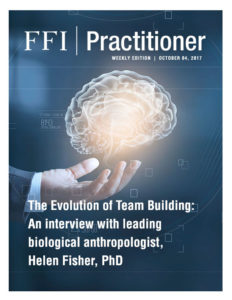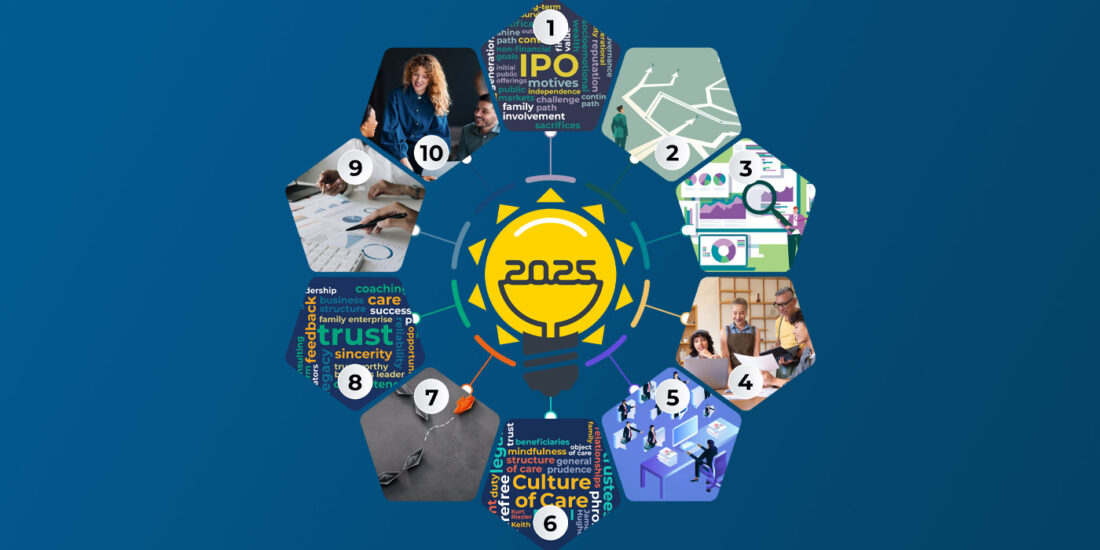
View this edition in our new enhanced digital edition format with supporting visual insight and information.
We are thrilled to be interviewing Dr. Helen Fisher in this week’s edition and to be hearing her keynote address entitled, “The Neuroscience of Team Building and Innovation: How Family Firms Can Thrive using Brain Science,” at the upcoming 2017 FFI global conference in Chicago. As a biological anthropologist, she has conducted extensive research and written six books on the evolution and future of human sex, love, marriage, gender differences in the brain and how your personality style shapes who you are and who you love. In her work she has identified four styles of thinking that not only have implications for personal relationships, but also for organizations and team building. In fact, her work is being used at companies such as Deloitte. Today, we learn more about her research and the implications for family enterprises.
Practitioner: So what, exactly, is a biological anthropologist?
Helen Fisher (HF): When you get a Ph.D. in anthropology there are four subfields. Some people get a Ph.D. in cultural anthropology, which is studying cultures around the world. Some people get a Ph.D. in archaeology, which is studying cultures of the past. Some people get a Ph.D. in anthropological linguistics, which is a study of languages around the world and the evolution of languages. And the fourth are, people like me, who study human variation and human evolution. So my Ph.D. was in human evolution. I first studied the evolution of female sexuality, the evolution of pair bonding or monogamy, and then I moved into the evolution of the brain and how the brain works. So what I look at is basic, human personality styles that evolved millions of years ago so that our ancestors could work as a team. To do that I have to know quite a bit of psychology, of course, and sociology, but what I really do is put people in brain scanners and study the brain circuitry of personality.
Practitioner: How does your knowledge of brain chemistry and neuroscience inform your study of business leadership and innovation?
HF: In studying the brain I have discovered that we’ve evolved four very broad styles of thinking and behaving linked with dopamine, serotonin, testosterone, and estrogen systems. There are a lot of systems in the brain, but most of them keep the eyes blinking or the heart beating. They’re not linked with personality traits. These four basic biological systems are linked with personality traits.
So, if you are very expressive of the traits of the dopamine system in the brain you tend to be novelty seeking, risk taking, curious, creative, spontaneous, energetic, and mentally flexible. In an organization, these people are going to innovate and lead in certain ways. They’re going to be more flamboyant. They might make decisions more quickly. They are going to be more daring. They’re going to come up with a lot of original ideas. Idea generation is in the dopamine system. So these are the people that are going to be very valuable for thinking outside the box, coming up with something that others haven’t thought of.
People who are very expressive of the traits of the serotonin system tend to be traditional and conventional. They follow the rules and respect authority. They are concrete thinkers, rather than theoretical, and they’re more cautious. They also tend to be more religious. They tend to be more literal. Within an organization these people are going to innovate in terms of processes. These people are managers. They’re going to figure out a better way to make a mouse trap. They’re not going to figure out a new kind of mouse trap, but instead they’re going to figure out a better process for making the mouse trap that they’ve already got, which is very valuable.
The people who are very expressive of the testosterone system tend to be analytical, logical, direct, decisive, tough-minded, skeptical and good at what scientists call “rule-based systems,” which is everything from computers to engineering to math to mechanics and music—music is very structural. These people are going to be very strategic thinkers. They’re going to be very daring, and they’re going to be very techie. They may not come up with the newest idea but they’re going to know how to make that idea work technologically.
And the fourth personality are the people who are very expressive of the estrogen system. These people tend to be contextual, holistic, synthetic, long-term thinkers. They like the process. It’s not just the goal — it’s the process of how you get there. They have very good people skills and very good verbal skills. They tend to be empathetic and trusting. And if you trust the right person you actually save a lot of metabolic energy. These people can size you up so they can actually figure out who to trust and not to trust. They’re intuitive and imaginative. In an organization they are going to be very good at services, at advertising the products, speaking to people about the products, explaining the products verbally and in writing, etc.
Organizations really need all four kinds of leadership and innovation. They work together. For millions of years we’ve lived in these little hunting and gathering groups and together we made decisions. Anthropologists now think that we lived in groups of about 25 individuals, about three extended family groups. Ten or twelve of were children and early adolescents, and the rest were adults.
So, just think about this group walking over a hill, and they suddenly see a pile of mushrooms. They can’t have all the high dopamine types say, “Let’s try the mushrooms!” They’re going to have some of the high serotonin, cautious types say, “It’s not in our tradition to try these mushrooms.” They’re going to have some of the high testosterone types who are going to say, “Let’s make an experiment, let’s feed the mushrooms to the dogs and see what happens first.” And they need some of the estrogen types to say, “Listen, let’s sit down before we do anything and talk and pool our data about these mushrooms.” So they evolve together, the four broad personality styles.
We have a four–million-year history of working together in these kinds of groups, largely family groups. We lived in clans. We lived in tribes. We knew who was who. I think it’s a very natural thing for people to live and work in family groups, to inherit family businesses, to be taught by your parents and your grandparents. That’s very natural in terms of the way the brain works. But, you do want an array of different kinds of people with different kinds of innovative and leadership characteristics in the group.
Practitioner: In what ways do communities benefit from strong familial relationships?
HF: Well, there must be some benefit because strong family relationships have been around for a good 4.4 million years! So it is clearly, from a Darwinian evolutionary perspective, an adaptive mechanism that does a lot of things. If people can get along with each other, they’re going to work well together. They are going to believe in the same gods. They are going to eat the same foods. They are going to reprimand people who are not behaving properly, and reward people who are. They are going to share the same values, daily habits, and goals. They are going to bring stability to the community.
Practitioner: Are there benefits for couples in love working together in business or philanthropic efforts? Are there drawbacks?
HF: I think that being in love is a tremendous asset. These couples end up spending lot of time talking to each other not just in the work mode. They can solve things around the breakfast table or as they’re walking along the beach on vacation. They share a lot of the same habits and are likely going to have a shared perspective. And if they are in a good business relationship, I would think that that would also be a tremendous addition to the personal relationship. One of the problems these days is that we spend more time in the office than we do at home. So I think being a couple is a tremendous asset for people. I think they may learn to admire parts of each other that they would never have had a chance to admire otherwise.
Now, there are potential drawbacks. You might disagree on things in the business and bring that disagreement into the relationship. It might jeopardize your ability to get new ideas if you are thinking very similarly. You might get so involved in your own chatter that you don’t reach out to other people, even your children.
Going back to my personality styles, you don’t want two people who think exactly alike. So, I guess my caveat would be: understand who you are; understand who your partner is; see where the gaps are; and get some other people around you who can be visionary in ways that you’re not going to be, or detail-oriented, or process-oriented, or socially skilled. And in a family business (or any business) you need to have a good balance of these four styles of thinking and being.
Practitioner: Thank you so much for your time today. We are looking forward to learning much more about this during your keynote at our upcoming conference in Chicago.
HF: Thank you.
About the contributor
 Helen Fisher, PhD. is a biological anthropologist, a member of the Center for Human Evolutionary Studies in the Department of Anthropology, Rutgers University, a Senior Research Fellow at The Kinsey Institute, Indiana University, and Chief Scientific Advisor to Match.com. She has written six internationally best-selling books and many articles on the brain science of human social behavior. She is currently studying the biological basis of personality and is a pioneer in examining the neurochemistry of leadership and innovation. Learn more about Dr. Fisher and her groundbreaking research at www.HelenFisher.com, www.TheAnatomyOfLove.com and www.NeuroColor.com.
Helen Fisher, PhD. is a biological anthropologist, a member of the Center for Human Evolutionary Studies in the Department of Anthropology, Rutgers University, a Senior Research Fellow at The Kinsey Institute, Indiana University, and Chief Scientific Advisor to Match.com. She has written six internationally best-selling books and many articles on the brain science of human social behavior. She is currently studying the biological basis of personality and is a pioneer in examining the neurochemistry of leadership and innovation. Learn more about Dr. Fisher and her groundbreaking research at www.HelenFisher.com, www.TheAnatomyOfLove.com and www.NeuroColor.com.






